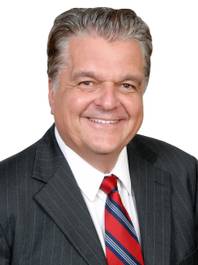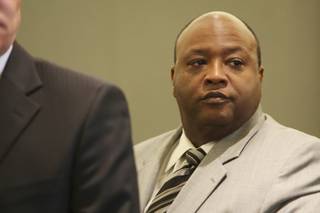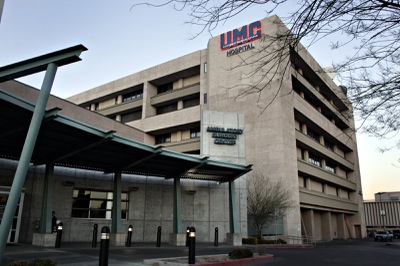Thursday, April 1, 2010 | 2 a.m.
Sun archives
- Jurors hear opening arguments in trial of former UMC chief (3-23-2010)
- Jury seated in theft trial of former UMC chief (3-22-2010)
- Lacy Thomas’ rising star came crashing down with firing (3-18-2010)
- Former UMC chief set to stand trial on theft, misconduct charges (3-18-2010)
- Dose of Rogers for ailing UMC (1-14-2010)
- A black eye in medicine brings posturing, again (4-9-2009)
- Testimony: Thomas boldly cut iffy deals (2-26-2008)
- Indictment says UMC chief made no-work deals (2-21-2008)
- Former UMC boss indicted (2-20-2008)
- Glitch puts grand jury on hold over UMC (2-13-2008)
- In UMC corruption case, shoe to drop soon (2-12-2008)
- Trail from UMC leads to suspect goods (2-1-2008)
- DA will go after former UMC boss (1-04-2008)
County officials are expected to agree as early as next week to hand over at least $500,000 to a company they fired three years ago after paying it nearly $1.3 million to do little work.
The company, ACS Consulting Co., held one of the contracts that got former University Medical Center chief Lacy Thomas in trouble, and it has been cited as a prime example of the way Thomas allegedly gave the public’s money to his cronies.
But the contract also appears to be a prime example of how Clark County commissioners share some of the blame for the waste of money at UMC, and it serves as the latest fuel for the argument that someone other than commissioners should oversee the public hospital.
In their self-designated role as the hospital’s board of trustees, commissioners had several opportunities to squelch or at least call for closer examination of the allegedly wasteful contracts for which Thomas is on trial.
In ACS’ case, commissioners awarded the company a contract to aggressively collect money from patients who had not paid their hospital bills. ACS was to be get a monthly management fee of $25,000 plus commissions based on the amount of money it collected beyond a monthly baseline number — a baseline that kept getting lower with subsequent contract amendments.
Commissioners unanimously approved the contract in June 2005, as well as two amended versions the following year. The contract and amendments were initialed by Donald Haight, who was UMC’s executive director of contract management but is no longer affiliated with the hospital.
The commissioners approved the second amendment in September 2006, less than a week after Clark County Auditor Jerry Carroll issued a report highly critical of the contract. Carroll found that ACS, now based in Dallas, stood to make millions of dollars in commissions even if there was no improvement in UMC’s cash flow. He also said the work overlapped a contract awarded to another company.
Apparently that wasn’t enough to get the attention of the commissioners at the time — Rory Reid, Tom Collins, Bruce Woodbury, Chip Maxfield, Yvonne Atkinson Gates, Myrna Williams and Lynette Boggs.
A few months later, however, they got fed up with Thomas failing to answer their questions about the hospital’s financial problems and they fired him in January 2007.
The commissioners had taken note of ACS’ perceived lack of performance by then, leading to cancellation of its contract on Feb. 28, 2007.
Leading up to a Clark County grand jury indictment of Thomas in February 2008, a Metro Police affidavit stated that he was a good friend of ACS Senior Vice President Bob Mills. The two reportedly hammered out the contract after flying to St. Thomas in the Virgin Islands to observe an agreement ACS had with a hospital there. On May 26, 2005, Mills wrote to Thomas with a proposal to work with UMC. Less than two weeks later, the agreement was ratified by the county commissioners.
So, did the commissioners bother to even look at the contract before it was approved to make sure everything was on the level? Las Vegas attorney James Pisanelli, who represents ACS, filed a scathing critique as part of a June 2008 court document.
The company sued UMC in March 2007, claiming it was owed $960,697 at the time its contract was terminated. UMC’s counterclaim: ACS did such a poor job it should pay damages to the hospital for breach of contract.
Pisanelli accused the hospital of “taking the opportunity to deflect attention from its internal lack of oversight and accountability by lashing out at those with whom it did business during the tenure of its former CEO who has since fallen from grace.
“Considering UMC’s lackluster history of underperformance and fiscal irresponsibility, that it is now trying to seek $18 million on accounts it would never have collected from on its own pursuant to a contract where it assumed zero risk is laughable. UMC cannot, for the first time ever, make it in the black simply by suing for ‘damages’ expressly prohibited by the clear terms of its valid contracts.”
Pisanelli reminded the court that the contract and the amendments were approved by commissioners, were initialed by Haight and signed by Thomas.
“So, if UMC’s claimed lack of awareness of the terms of the contracts stems from a failure by the board of trustees to read the contracts and deny the requested approval, ACS’ contractual rights are unaffected,” Pisanelli wrote.
In other words, the county’s top officials agreed to the ACS contract and amendments, even if they turned out bad for UMC. Pisanelli also noted that there was no formal allegation that ACS committed any fraud. Indeed, neither ACS or any other company Thomas dealt with while at UMC has been indicted.
In June 2008, District Judge Elizabeth Gonzalez awarded ACS a partial summary judgment of $200,000 after determining that UMC breached the contract by failing to pay the company a $25,000-a-month management fee from June 2006 to January 2007. The county said it had stopped paying the fee because of the company’s poor performance. Problem was, it didn’t terminate the contract until eight months later.
Gonzalez scheduled an April 19 trial to decide remaining issues in the lawsuit. But during opening statements at Thomas’ trial last week, lawyers disclosed that the county was preparing to settle the civil case by paying ACS at least $500,000.
Reid and Collins, current commissioners who were on the board when the ACS contract was approved, did not return repeated phone calls seeking comment.
Commissioner Steve Sisolak characteristically returned the Sun’s phone call, but said he could not discuss the pending settlement. “All I can say is we were told by the county’s lawyers that we owed ‘X’ amount of dollars” to the company, he said.

Steve Sisolak

Bruce Woodbury

Jim Rogers
He also said that he and the current commissioners are vetting contracts and other agenda items more thoroughly before acting on them.
The problem is that commissioners “cannot read every document that crosses their desks,” said Woodbury, who served as a commissioner from 1981 through 2008.
In the case of ACS, commissioners placed their faith in Thomas and approved the contract he recommended because they had put him in charge of UMC, Woodbury said.
But, Woodbury added, commissioners are overloaded with UMC. “They have so many issues going on that it’s really difficult to concentrate on a hospital that continues to have problems,” he said.
That’s one reason Woodbury and Sisolak agree with former Nevada higher education Chancellor Jim Rogers’ call for commissioners to hand over oversight of UMC to experts. In January, Reid put Rogers in charge of mapping out a new future for UMC, one intended to reduce the county’s costs of running the hospital.
Rogers said Wednesday he has forwarded a proposal to the county that he thinks the commissioners will consider within the next two to three weeks that would transfer oversight of UMC to a new nine-member board made up of doctors, Medicaid and billing experts. Each commissioner would appoint a member and two others would be appointed by the chancellor of higher education.
“The current setup is all politically driven,” Rogers said. “There are no experts on the county commission who have a clue about how to run the hospital.”
Another board that would report to the operating board would also be made up of nine members, four appointed by the commissioners and four appointed by the higher education system to create a strong relationship between the hospital and the University of Nevada School of Medicine. Rogers is proposing that Dr. John Ruckdeschel, director and CEO of the Nevada Cancer Institute, serve as the ninth member of that board.
If the commissioners don’t approve these proposals, “there’s no sense going forward,” Rogers said.



Join the Discussion:
Check this out for a full explanation of our conversion to the LiveFyre commenting system and instructions on how to sign up for an account.
Full comments policy